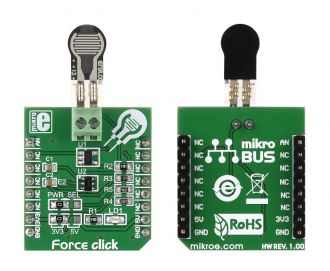
We strongly encourage users to use Package manager for sharing their code on Libstock website, because it boosts your efficiency and leaves the end user with no room for error. [more info]

Rating:
Author: MIKROE
Last Updated: 2019-03-15
Package Version: 1.0.0.1
mikroSDK Library: 1.0.0.0
Category: Force
Downloaded: 6092 times
Not followed.
License: MIT license
Force click is a mikroBUS add-on board with circuitry for implementing Interlink Electronics’ Force Sensing Resistors into your projects (with the sensor included with the click).
Do you want to subscribe in order to receive notifications regarding "Force click" changes.
Do you want to unsubscribe in order to stop receiving notifications regarding "Force click" changes.
Do you want to report abuse regarding "Force click".

Library Description
The library covers all the necessary functions to control Force click board. Force click communicates with the target board via analog ( AN ) pin. This library contains drivers to read ADC value of Force Sensing Resistor.
Key functions:
Examples description
The application is composed of three sections:
void applicationTask()
{
valueADC = force_readADC();
Delay_100ms();
IntToStr( valueADC, logText );
mikrobus_logWrite( " ADC value: ", _LOG_TEXT );
mikrobus_logWrite( logText, _LOG_LINE );
mikrobus_logWrite( "-------------------", _LOG_LINE );
Delay_1sec();
}
Additional Functions :
Other mikroE Libraries used in the example:
ADCUART​ConversionAdditional notes and informations
Depending on the development board you are using, you may need USB UART click, USB UART 2 click or RS232 click to connect to your PC, for development systems with no UART to USB interface available on the board. The terminal available in all MikroElektronika compilers, or any other terminal application of your choice, can be used to read the message